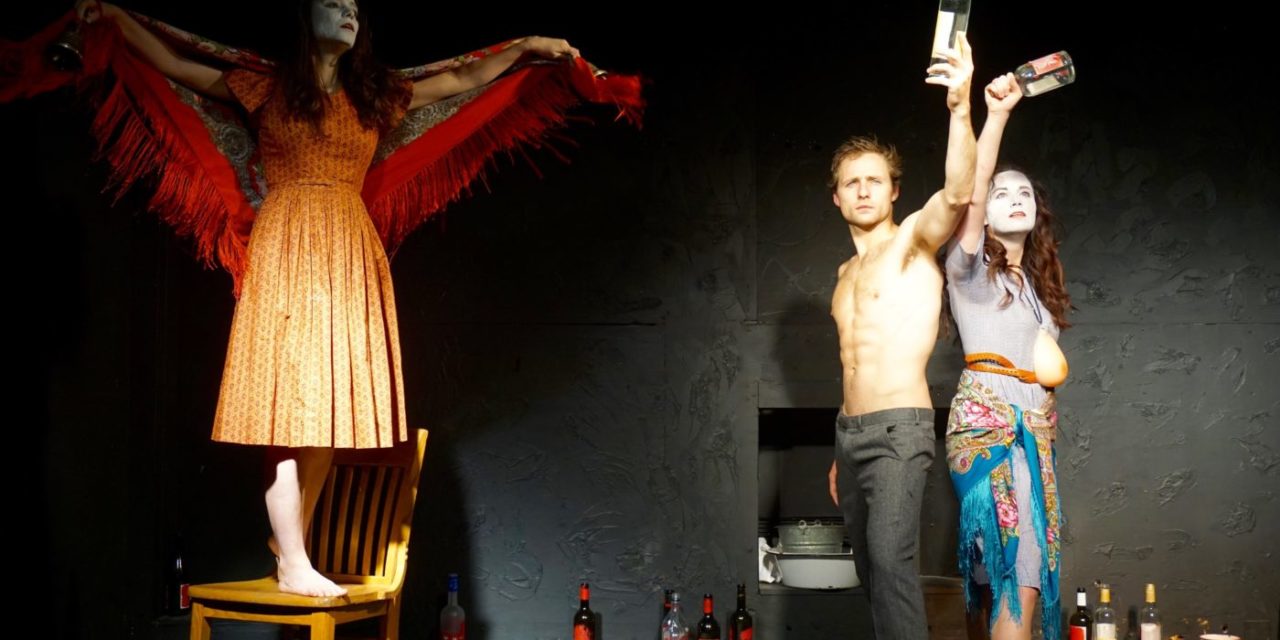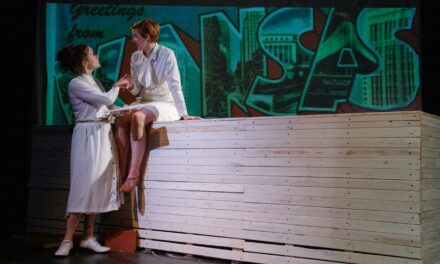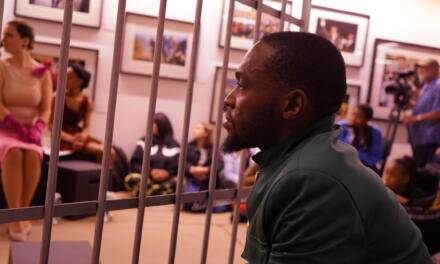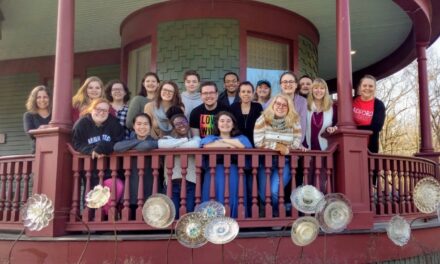The East Village Playhouse, a recently created storefront venue in a defunct music shop, is home to the suitably raffish “All Roads Lead to the Kurski Station”. The theater is technically a black box and little more yet the stark setting is both evocative and authentically gritty. The Playhouse is an apt setting for this experimental production based on the satirical poem by Venedikt Erofeev, billed in the program as Russia’s first postmodern work of literature. The poem, written in 1970, was adapted for the stage in 1994 in London as a solo performance called “Moscow Stations.” It played in the West End before transferring to an Off-Broadway run in New York with star Tom Courtenay.
This current production features a male lead and two women who comprise a sort of demonic chorus of two. When they’re not providing movement and humor with their mocking commentary on the story, they’re portraying various supporting characters in a series of delirious, amusing vignettes. With little more than a few chairs, boxes, and a wash basin and pitcher, the dynamic actors promptly sweep up the audience into their nightmarish world of missed connections and menacing characters.
Vienya, played by Elliott Morse, alternately conveys his episodic journey and reveals his increasingly distressing interior thoughts in a lyrical mashup that is both engrossing and disorienting. The action begins with the women, played by Rivers Duggan and Mia Vallet, placing a bowl on the stage and standing on either side of it. Morse then enters from the audience and stands in the bowl, facing upstage. He then proceeds to undress, revealing a Caravaggio nude to the audience. The women pour water over his body, rendering his porcelain flesh a glistening sculpture. That is the evening’s most memorable image. While there are other highlights of the performance, one wishes there was just a bit more visual transcendence. A couple of painted signs to help the audience navigate Morse’s journey would’ve been effective.
The production is both adapted and directed by the monomial Varda, a political dissident from Communist Poland. He brings an innate understanding of the complex source material to the production and effectively conjures a Soviet-era Moscow in the bowels of the once politically febrile East Village. The evening is prudently kept to one hour, as much more would risk repetition and fatigue.
While Morse shoulders much of the narrative, it is the women who most effectively embrace the hysteria and dissonance of the production, often cackling and making threatening faces. Morse’s performance gratefully improves over the course of the evening, as his de facto wide-eyed countenance in the early moments lacks nuance. The production’s debt to the pioneering work of Modern European theatre pioneers such as Brecht, Kantor, and Grotowski is both evident and refreshing. European-inspired experimental theatre is in relatively short supply on New York’s stages. It’s an intriguing parlor game to consider what dissident literary work Varda might next bring to a New York stage.
The lighting design by David J. Palmer is effective in its simplicity, as is the uncredited costume design, featuring red scarves draped in a style reminiscent of Stevie Nicks or Isadora Duncan. The makeup features the women in thick, white Kabuki greasepaint. The music, composed by Scott Griffin is likewise a highlight, featuring emotive saxophone which effectively augments the spare set. The props and blocking also merit praise, as the playing area is conspicuously finite and the actors manage to utilize its wide but shallow stage adroitly.
The elaborately detailed production notes help contextualize the performance. They’re most effective in suggesting parallels between post-Stalin era Russia and the present day United States under Trump. The deliberately elliptical nature of the text renders a thorough analysis challenging. “Kurski Station” is as an immersive experience and ultimately a worthy evening for those seeking heady catharsis and a smorgasbord of European experimental theatre influences, not to mention a few hearty laughs.
All Roads Lead to the Kurski Station is playing at the East Village Playhouse, 340 East 6th Street in New York City.
This post was written by the author in their personal capacity.The opinions expressed in this article are the author’s own and do not reflect the view of The Theatre Times, their staff or collaborators.
This post was written by Jack Wernick.
The views expressed here belong to the author and do not necessarily reflect our views and opinions.


















